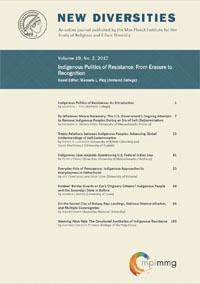Indigenous Lèse-majesté: Questioning U.S. Federal Indian Law
by Peter d’Errico (Emeritus, University of Massachusetts / Amherst)
To cite this article: d’Errico, P. (2017). Indigenous Lèse-majesté: Questioning U.S. Federal Indian Law. New Diversities, 19(2), 41–54. https://doi.org/10.58002/h9r5-ds74
United States “federal Indian law” consists of a body of rules rooted in the colonial doctrine of “Christian discovery.” Viewed through the lens of Carl Schmitt’s concept of “sovereign ban,” Christian discovery creates a “state of exception,” placing Native Peoples both inside and outside the constitutional order of the United States and simultaneously constituting the claim of U.S. sovereignty. The instability inherent in this double performance emerges as the “paradox of sovereignty.” Native self-determination efforts appear as lèse-majesté – ”insults to sovereignty” – heretical acts challenging Christian colonial domination.
Keywords: United States federal Indian law, Indigenous peoples, Christian colonialism, sovereignty theory, self-determination, critical theory, legal studies
|
